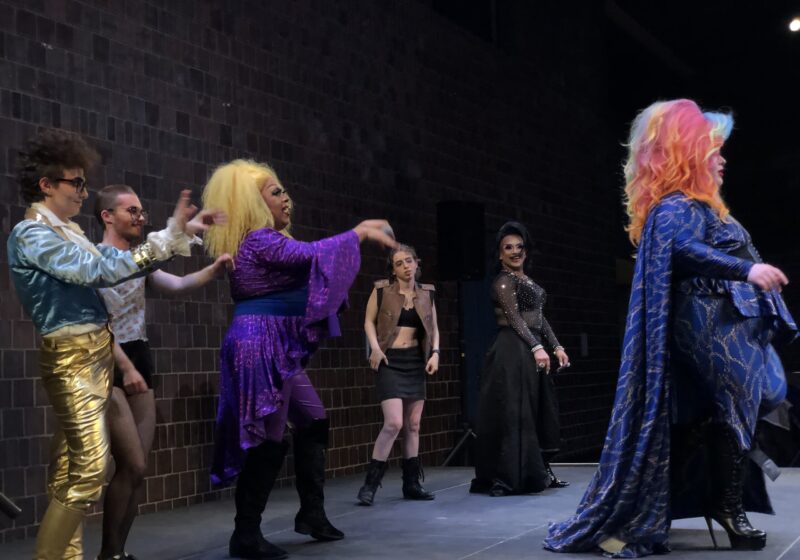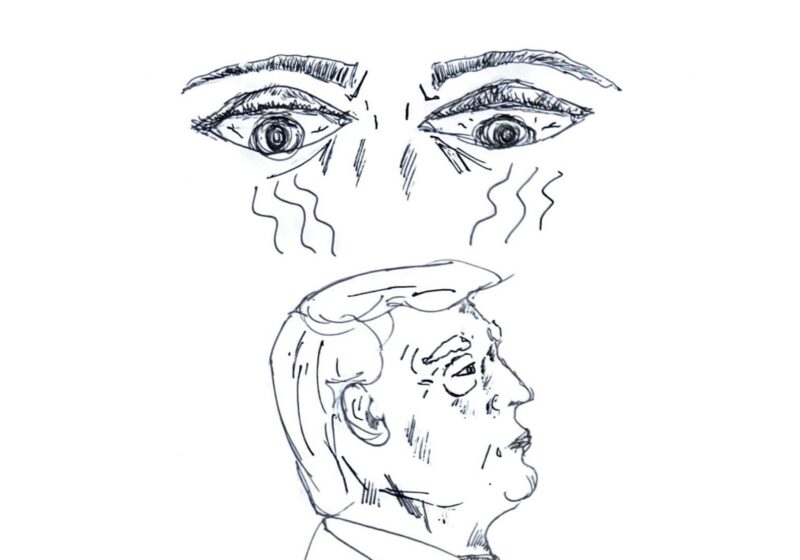On March 23, the University’s May Room burst into light and sound for outGRAD’s Drag Charity Show.
outGRADS @ UR, a campus-wide graduate and postdoctoral student organization, hosted the event to bring visibility to ongoing LGBTQ+ issues throughout the Rochester area.
Between sets packed with elaborate costumes and pop hits ranging from FEMM’s “Fxxk Boyz Get Money” to ABBA’s “Lay All Your Love on Me,” attendees were treated to hosts Samantha Vega and Vivian Darling’s colorful commentary.
Vega, today a performer at ROAR Nightclub, was designated by the Empire State Pride Agenda as one of their 25 Community Champions in 2015. She was also the chair of ROC Pride from 2015 to 2017, and has participated in pride committees for more than a decade.
Other stars of the show included performers Jack Vanity, Alexia Mirage, Ezra Pecker, and stand-up comedian Cass Warfare, whose last name is short for “there is no warfare but class warfare.”
Halfway through the show, Vega and Darling announced that over $1,375 had been raised to support LGBTQ+ youth in the Rochester area. Donations made during the show will go to the local Center for Youth, which provides shelter, housing, and crisis services for youth in need, with an emphasis on supporting queer youth.
The Center for Youth has worked to “address homelessness and reduce victimization of Rochester youth for over 45 years,” according to their website, where they currently accept donations. The Center offers a number of programs to support youth who are in unstable conditions or homeless — and, most prominently for the Drag Charity Show, the Arnett House.
First opening its doors in 2020, the Arnett House is “residence dedicated to providing housing and supportive services to LGBTQ and trafficked homeless youth,”according to the Center.
LGBTQ+ youth are especially vulnerable to housing displacement and unstable conditions, and experience homelessness at a higher rate than non-LGBTQ+ youth.
The Voices of Youth Count project from the University of Chicago’s Chapin Hall reports that LGBTQ young adults are more than twice as likely to experience homelessness than their non-LGBTQ peers. Youth who are Black or multiracial LGBTQ are at a greater risk still, with rates of homelessness reported at 16%, while white LGBTQ youth report a rate of 8%, according to youth.gov.
So, beyond the glamor and glitz of flashy clothes, bright colors, and the thumping music, the May Room was dedicated to two causes that night: awareness and support.
The Campus Times sat down with two of the performing drag queens, hosts Samantha Vega and Vivian Darling, to ask them, simply: Why drag?
Without a second’s pause, Vega said, “Why not?”
And then she laughed.
Attending Rochester Institute of Technology (RIT), Vega got her start doing drag for the Gay Alliance. There wasn’t anything like drag on college campuses in the 90s, she remembered — and when half the cast for a theater show quit, Vega stepped up as a member of the organizational committee to perform.
For Darling, Vega’s partner in crime, no one knew what drag was in the “middle-of-nowhere Pennsylvania” where she grew up, either.
“I didn’t know how many people were going to be here tonight, but I think it’s a little over 100, 150 probably in there,” Vega said. “And it’s good to see the message from the Center for Youth, but also for the queer-centric individuals and performers, that we’re still here despite all the struggles that we have to face in life and in today’s society.”
“It’s important for visibility, just to be seen,” Darling added later in the interview. “We didn’t have that when we were growing up. And so this program is important because it saves lives.”
First, but not foremost, Vega and Darling are drag queens for themselves. They echo each other’s sentiments — drag is empowering, drag is extravagant. In impeccable makeup and floor-length dresses made for show, they can be who they are.
“I felt that this was a moment to feel both beautiful and valid, important, and I just felt very grand,” Vega said. “And that’s what drag does to me, it gives me that feeling of grandiosity that it validates my existence. It just feels good.”
Towards the beginning of the show, a man in a dark jacket leaned out of the crowd — to hand Alexia Mirage a bouquet of flowers, wrapped with a ribbon.
Throughout the rest of the sets, the queens and kings often stepped down from the stage to twirl among the crowd, collecting tips and thanking patrons — because the night’s show ultimately came down to one thing.
“To raise an awareness that these kids do exist,” Vega said.
Vega and Darling both grew up as some kind of an “other”, outside of society’s box and on the fringes of the world in a way that is not easily explained.
But, despite both women’s self-described “otherness” in the fairly impromptu interview minutes before their next sets, their message was perfectly clear. All they want, they said, is for people to know that they’re there. That kids, like them — queer, transgender, gay or otherwise — are there.
“Even if someone’s just really shy and they come out and see that somebody is like them helps,” Darling said.
The best part? “They don’t need to put on the dress, or they don’t need to put on these fancy wigs to feel validated,” Darling said. “They can just see that they’re being accepted and that people are applauding somebody that’s just like them, and that’s important too.”
According to Vega and Darling, support for LGBTQ+ youth is critical in today’s society. Although LGBTQ+ acceptance has much improved since even the 1990s, queer individuals are still living under threat of danger and abuse.
The politicization of LGBTQ+ issues has resulted in a number of proposed bills striking at LGBTQ+ rights, including recent increases in legislature attacking gender-affirming care for trans individuals, bans on drag, and attempts to roll back the right of same-sex couples to marry, as held by the Supreme Court in 2015.
Nevertheless, though — they persevere.
“We’re not going anywhere,” Vega said — anywhere except for back to the show, in a long, ice-blue dress and a platinum blonde wig, ready to rock the night ahead.








